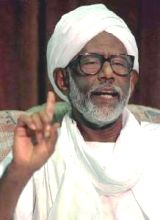Turabi pledges peaceful opposition to Sudan govt
By Opheera McDoom
KHARTOUM, July 11 (Reuters) – Islamist leader Hassan al-Turabi promised on Monday to stick to peaceful opposition to the Khartoum government, just days after his release from 18 months in detention for allegedly plotting a coup.
 Turabi, a major political force in Sudan and a respected Islamist ideologue, was freed on June 30 after his former ally, President Omar Hassan al-Bashir, announced the release of all political prisoners.
Turabi, a major political force in Sudan and a respected Islamist ideologue, was freed on June 30 after his former ally, President Omar Hassan al-Bashir, announced the release of all political prisoners.
Asked how he intended to oppose the government, Turabi, who backed Bashir’s bloodless military coup in 1989, told Reuters in an interview: “Of course by peaceful means … We cannot use force.”
Analysts say the ghosts of a rift in 1999 between Turabi and Bashir still haunt the government, which is not sure who within its ranks might still be loyal to Turabi and who is loyal to the president. Turabi was secretary-general of the ruling National Congress Party’s (NCP) predecessor, the National Islamic Front.
The political climate in Khartoum has improved since the government and the southern Sudan People’s Liberation Movement signed an agreement in January ending more than 20 years of war.
Rebel leader John Garang was sworn in as first vice president and a new constitution adopted on Saturday, ushering in a period of coalition rule after the devastating conflict.
BADLY DRAFTED
Turabi criticised the constitution, saying it guarantees an unelected majority in parliament for the ruling party to pass unopposed any legislation it wishes.
“It’s a badly drafted constitution. It’s worse than the previous one,” said Turabi, a lawyer who was educated at the University of London and the Sorbonne in Paris.
“They give a 52 percent majority to the (NCP) in the new parliament … an automatic majority in all resolutions — that is not fair for the south itself.”
The constitution gives Bashir’s ruling NCP 52 percent of parliament and government, the SPLM 28 percent and northern and southern opposition parties the remaining 20 percent.
Turabi said Garang’s SPLM had been more concerned with looking after southern, rather than national, interests when drafting the constitution.
The peace deal shares wealth and power between the north and south, creating two separate armies, two different banking systems and a coalition government. It also allows southerners a referendum on secession after six years.
“The south, once it secured its own financial resources, its own army … its right to self-determination, they ignored looking into the national constitution,” Turabi said at his home in Khartoum. Nevertheless, he believed the presence of the SPLM in government would have a positive influence.
“This is a new force that probably will weigh for liberty rather than for authority,” Turabi said. “Probably because they (the SPLM) have been in rebellion they will balance it a little bit towards freedom.”
Turabi, 73, has spent about 11 years in jail throughout a long and tumultuous political career in Sudan. His Popular Congress Party recently signed a political alliance with the opposition Umma Party, widely believed to enjoy the one of the largest support bases in Sudanese politics.
Before his release on June 30, Turabi had been in detention or house arrest since March 2004, after his party was loosely linked to a plot by a group of military officers to topple the government. He was never charged and did not face trial.
Bashir’s government has also accused him of supporting the Justice and Equality Movement (JEM), one of two main rebel groups which took up arms in early 2003 in the remote western Darfur region, a charge Turabi and the group deny.
However, Turabi said he had been in telephone contact with JEM to urge the group to find a political settlement to end the conflict which has killed tens of thousands of people and forced more than 2 million from their homes.
